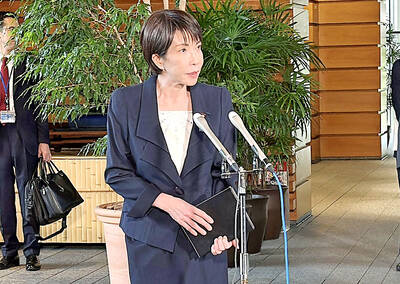An elderly Chinese-born engineer convicted of economic espionage for hoarding sensitive documents that included space shuttle details faced sentencing yesterday, with prosecutors seeking a 20-year term.
A judge found Dongfan “Greg” Chung, 74, guilty in July of six federal counts of economic espionage and other charges for keeping 300,000 pages of sensitive papers in his home. The documents also included information about the fueling system for a booster rocket.
Despite Chung’s age, prosecutors have requested a 20-year sentence, in part to send a message to other would-be spies.
Assistant US Attorney Greg Staples noted in sentencing papers that Chung amassed a personal wealth of more than US$3 million while betraying his adopted country.
“The [People’s Republic of China] is bent on stealing sensitive information from the United States and shows no sign of relenting,” Staples wrote. “Only strong sentences offer any hope of dissuading others from helping the PRC get that technology.”
Chung’s attorney, Thomas Bienert, did not return a call for comment. He has said his client would appeal.
Defense attorneys also filed a motion last week accusing prosecutors of withholding a report about an FBI interview with a Chinese professor with whom Chung corresponded.
The attorneys requested an evidentiary hearing yesterday on the matter. It was unclear if US District Judge Cormac Carney would grant the motion.
The government accused Chung, a stress analyst with high-level clearance, of using his 30-year career at Boeing Co and Rockwell International to steal the documents. They said investigators found papers stacked throughout Chung’s house that included sensitive information about the booster rocket — documents that employees were ordered to lock away at the end of each day. They said Boeing invested US$50 million in the technology over a five-year period.
During the non-jury trial, Chung’s lawyers argued that he may have violated Boeing policy by bringing the papers home, but he didn’t break any laws by doing so, and the US government couldn’t prove he had given secret information to China.
In his ruling, Carney wrote that the notion that Chung was merely a pack rat was “ludicrous” and said the evidence showed that he had been passing information to Chinese officials as a spy.
The government believes Chung began spying for the Chinese in the late 1970s, a few years after he became a naturalized US citizen and was hired by Rockwell International.
Chung worked for Rockwell until it was bought by Boeing in 1996.

‘MOTHER’ OF THAILAND: In her glamorous heyday in the 1960s, former Thai queen Sirikit mingled with US presidents and superstars such as Elvis Presley The year-long funeral ceremony of former Thai queen Sirikit started yesterday, with grieving royalists set to salute the procession bringing her body to lie in state at Bangkok’s Grand Palace. Members of the royal family are venerated in Thailand, treated by many as semi-divine figures, and lavished with glowing media coverage and gold-adorned portraits hanging in public spaces and private homes nationwide. Sirikit, the mother of Thai King Vajiralongkorn and widow of the nation’s longest-reigning monarch, died late on Friday at the age of 93. Black-and-white tributes to the royal matriarch are being beamed onto towering digital advertizing billboards, on

Indonesia was to sign an agreement to repatriate two British nationals, including a grandmother languishing on death row for drug-related crimes, an Indonesian government source said yesterday. “The practical arrangement will be signed today. The transfer will be done immediately after the technical side of the transfer is agreed,” the source said, identifying Lindsay Sandiford and 35-year-old Shahab Shahabadi as the people being transferred. Sandiford, a grandmother, was sentenced to death on the island of Bali in 2013 after she was convicted of trafficking drugs. Customs officers found cocaine worth an estimated US$2.14 million hidden in a false bottom in Sandiford’s suitcase when

POWER ABUSE WORRY: Some people warned that the broad language of the treaty could lead to overreach by authorities and enable the repression of government critics Countries signed their first UN treaty targeting cybercrime in Hanoi yesterday, despite opposition from an unlikely band of tech companies and rights groups warning of expanded state surveillance. The new global legal framework aims to bolster international cooperation to fight digital crimes, from child pornography to transnational cyberscams and money laundering. More than 60 countries signed the declaration, which means it would go into force once ratified by those states. UN Secretary-General Antonio Guterres described the signing as an “important milestone,” and that it was “only the beginning.” “Every day, sophisticated scams destroy families, steal migrants and drain billions of dollars from our economy...

PRESSURE: Trump is expected to demand that Tokyo raise its defense spending, but Japan’s new foreign minister said the amount is less important than how it is spent Japan plans to show its determination to further build up its defense to rapidly adapt to changing warfare realities and growing tension in the region when US President Donald Trump visits Tokyo next week, Minister of Foreign Affairs Toshimitsu Motegi said. Japanese Prime Minister Sanae Takaichi’s administration is also finalizing a purchase package, including US pickups, soybeans and gas, to present to Trump, but would not commit to any new defense spending target at the meeting, a source with knowledge of the preparations said. The two leaders are to sit down in Tokyo on Monday and Tuesday next week during Trump’s first